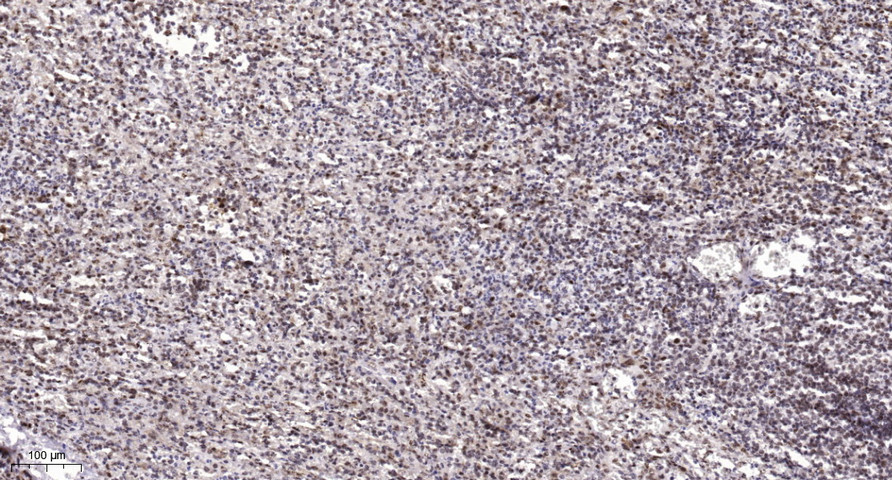ANR11 Rabbit Polyclonal Antibody
ANR11 Rabbit Polyclonal Antibody
- SPECIFICATION
- CITATIONS
- PROTOCOLS
- BACKGROUND

Application
| IHC, IF |
|---|---|
| Primary Accession | Q6UB99 |
| Reactivity | Rat, Human |
| Host | Polyclonal, Rabbit,IgG |
| Clonality | Polyclonal |
| Calculated MW | 297913 Da |
| Gene ID | 29123 |
|---|---|
| Other Names | Ankyrin repeat domain-containing protein 11, Ankyrin repeat-containing cofactor 1, ANKRD11, ANCO1 |
| Dilution | IHC~~1:100~500 IF~~1:50~200 |
| Storage Conditions | -20℃ |
| Name | ANKRD11 |
|---|---|
| Synonyms | ANCO1 |
| Function | Chromatin regulator which modulates histone acetylation and gene expression in neural precursor cells (By similarity). May recruit histone deacetylases (HDACs) to the p160 coactivators/nuclear receptor complex to inhibit ligand-dependent transactivation (PubMed:15184363). Has a role in proliferation and development of cortical neural precursors (PubMed:25556659). May also regulate bone homeostasis (By similarity). |
| Cellular Location | Nucleus {ECO:0000269|PubMed:15184363, ECO:0000269|PubMed:25413698, ECO:0000269|PubMed:25556659, ECO:0000269|Ref.1}. Note=Localizes to chromatin during prometaphase |

Thousands of laboratories across the world have published research that depended on the performance of antibodies from Abcepta to advance their research. Check out links to articles that cite our products in major peer-reviewed journals, organized by research category.
info@abcepta.com, and receive a free "I Love Antibodies" mug.
Provided below are standard protocols that you may find useful for product applications.
Background
This locus encodes an ankryin repeat domain-containing protein. The encoded protein inhibits ligand-dependent activation of transcription. Mutations in this gene have been associated with KBG syndrome, which is characterized by macrodontia, distinctive craniofacial features, short stature, skeletal anomalies, global developmental delay, seizures and intellectual disability. Alternatively spliced transcript variants have been described. Related pseudogenes exist on chromosomes 2 and X. [provided by RefSeq, Jan 2012],
If you have used an Abcepta product and would like to share how it has performed, please click on the "Submit Review" button and provide the requested information. Our staff will examine and post your review and contact you if needed.
If you have any additional inquiries please email technical services at tech@abcepta.com.













 Foundational characteristics of cancer include proliferation, angiogenesis, migration, evasion of apoptosis, and cellular immortality. Find key markers for these cellular processes and antibodies to detect them.
Foundational characteristics of cancer include proliferation, angiogenesis, migration, evasion of apoptosis, and cellular immortality. Find key markers for these cellular processes and antibodies to detect them. The SUMOplot™ Analysis Program predicts and scores sumoylation sites in your protein. SUMOylation is a post-translational modification involved in various cellular processes, such as nuclear-cytosolic transport, transcriptional regulation, apoptosis, protein stability, response to stress, and progression through the cell cycle.
The SUMOplot™ Analysis Program predicts and scores sumoylation sites in your protein. SUMOylation is a post-translational modification involved in various cellular processes, such as nuclear-cytosolic transport, transcriptional regulation, apoptosis, protein stability, response to stress, and progression through the cell cycle. The Autophagy Receptor Motif Plotter predicts and scores autophagy receptor binding sites in your protein. Identifying proteins connected to this pathway is critical to understanding the role of autophagy in physiological as well as pathological processes such as development, differentiation, neurodegenerative diseases, stress, infection, and cancer.
The Autophagy Receptor Motif Plotter predicts and scores autophagy receptor binding sites in your protein. Identifying proteins connected to this pathway is critical to understanding the role of autophagy in physiological as well as pathological processes such as development, differentiation, neurodegenerative diseases, stress, infection, and cancer.


